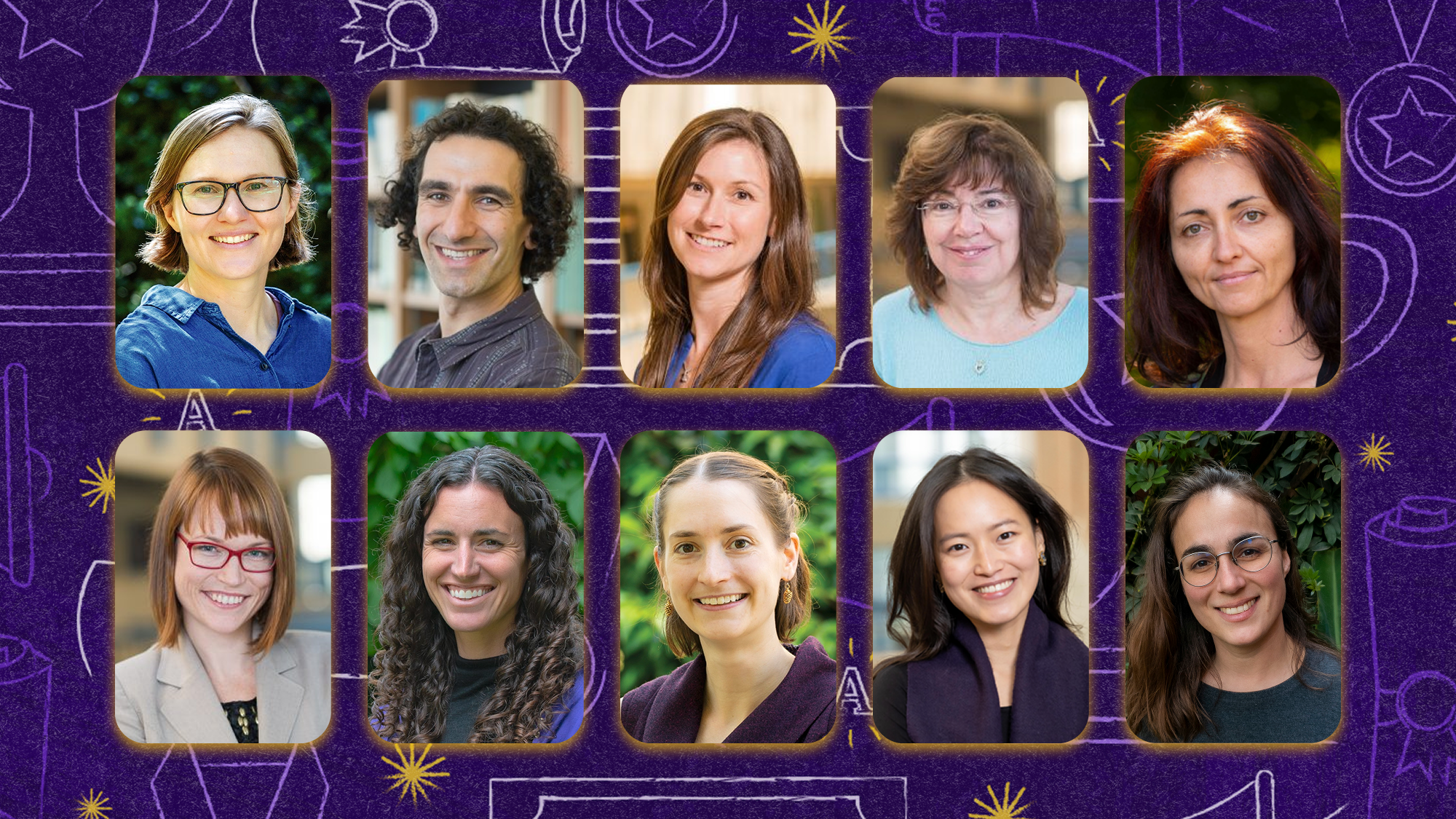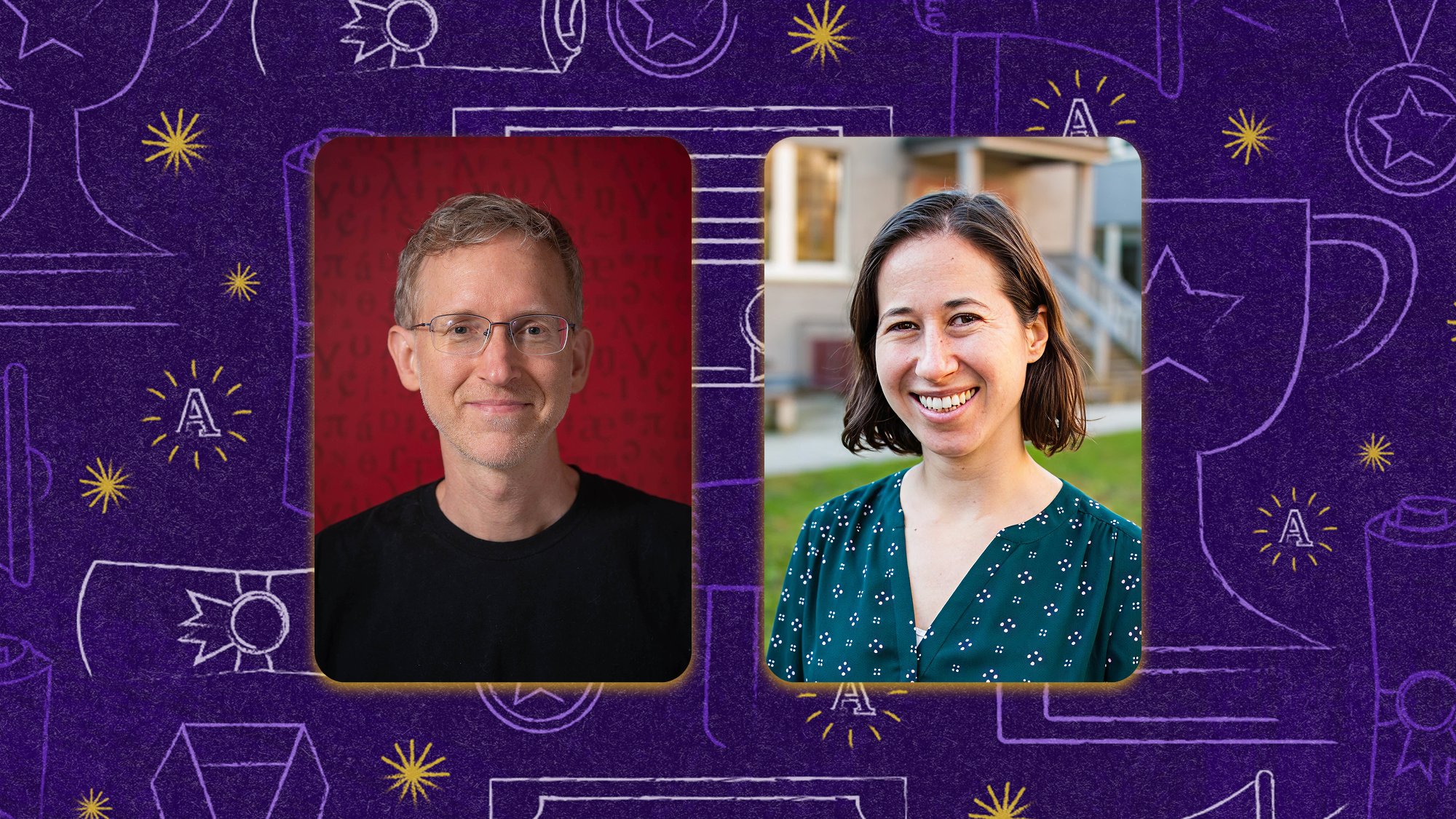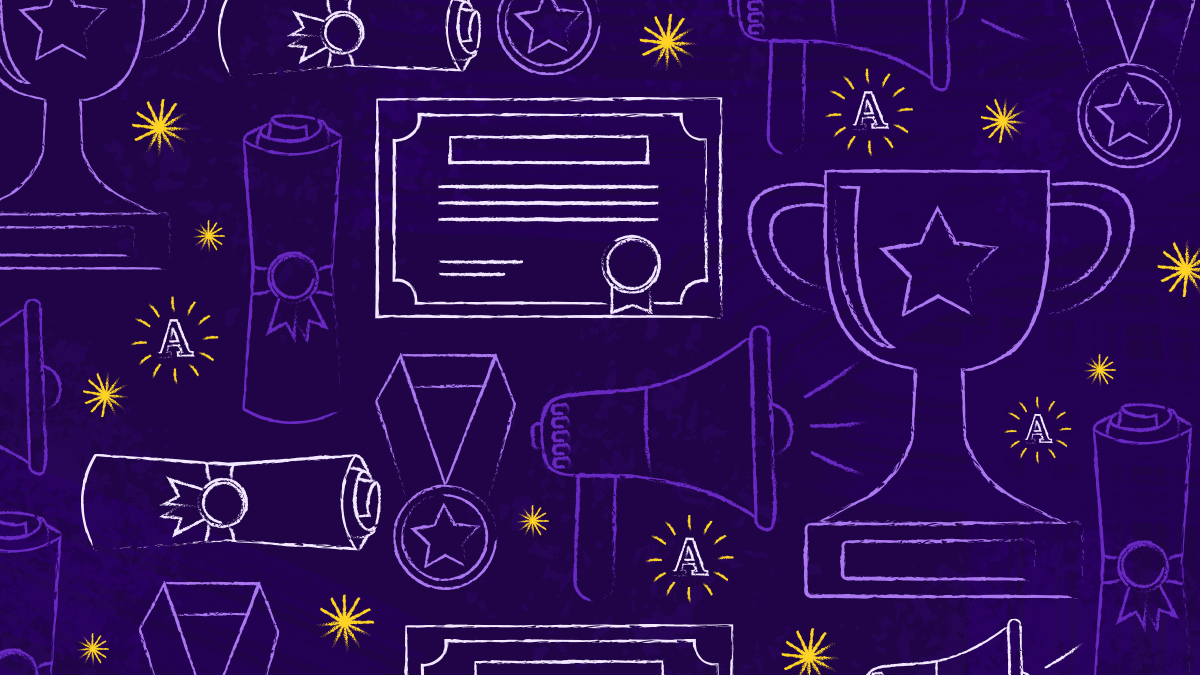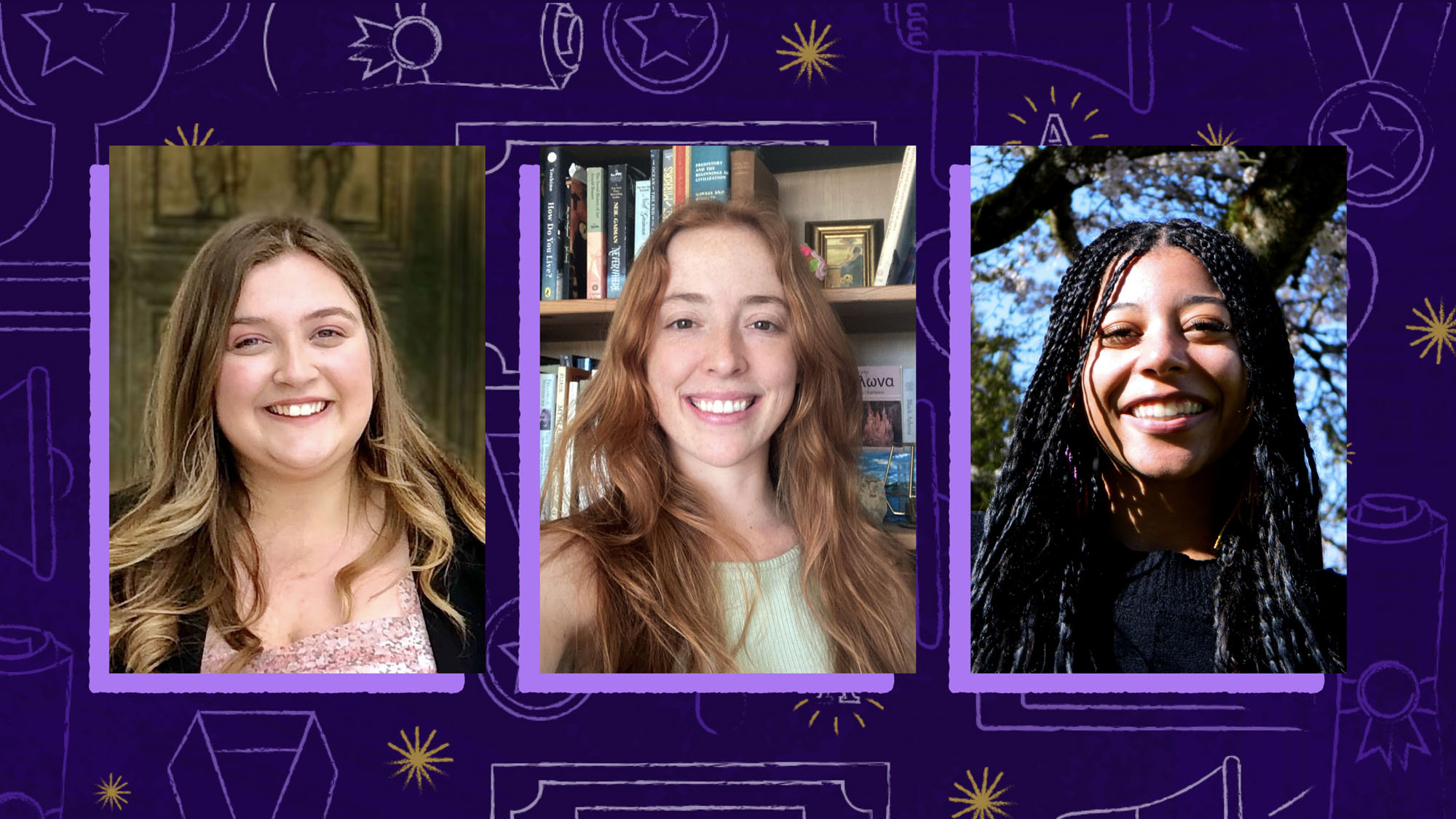

Ashley Haines, Hannah Stengler, and Trinity Stephens are recipients of the 2024 Outstanding Leader in the Faculty of Arts Award for their dedication and achievements within the Faculty.
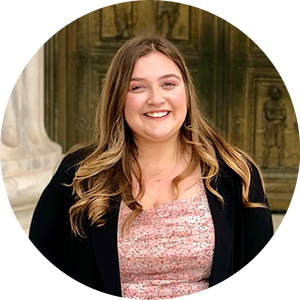

Ashley Haines, International Relations
Through the Arts Undergraduate Society (AUS), Ashley served as the Vice President External and as a Councillor on the Governance Committee, gaining exposure both in the external and internal portfolios of the association.
Ashley participated as a member within various student clubs including UBC Rotaract, UBC HOPE, and UBC Equal Voice.
What student leadership opportunity had the most impact on you during your time at UBC?
The AUS provided me with a space to return to at UBC following a two-year break after my first year. After being away from an educational environment, I felt a bit lost on how to “be” a student. From the AUS, I found lifelong friends who support each other in our endeavours beyond the AUS and UBC communities. I have furthermore been able to apply skills I’ve gained in the AUS into my professional roles in the non-profit and aviation sectors. It has offered me space to grow my confidence and further develop my skills, and I have been fortunate to step into mentorship roles and see the growth among others.
What does it mean to be a great Arts student leader?
The UBC motto, Tuum Est (It is yours) represents agency and opportunity that reminds students how their university journeys are what they make of it. To me, making an experience “mine” involved engaging in different clubs and communities both within and outside of campus. Finding a group of like-minded individuals who can support one another is a big part of what makes a leader. As I am continuously inspired by my friends, I find motivation to seek out ways to improve experiences for students in tangible and feasible ways. Being a great Arts student leader begins with knowing the community you’re in, and being able to bring your own unique experiences to collaborate, listen, learn, and lead alongside others.
What advice would you give to incoming UBC Arts students?
Take your time. As someone who took much longer than the typical 4-year degree, there were many times where I felt behind. Soon enough, I learned that everyone works at a different pace and that is okay. Life sometimes unfolds in ways beyond our control, and stepping away from what is comfortable and leaning into the process can be essential in discovering your personal needs. There is nothing wrong with taking time off to gain work experience, volunteer, travel, or other! I feel secure that I am leaving UBC knowing that I made the absolute most of my time here.
What did you learn about yourself at UBC?
I am capable! Throughout my time at UBC, I had many bouts of insecurity and often felt unsure if I would be able to persevere and graduate. Through these internal struggles, I learned that if I surround myself with good community, there is a level of support and accountability that enhances and supports my learning experience.
What message do you have for your graduating peers?
We made it through some tumultuous years and have come out stronger. We have taken time to learn about ourselves and what motivates us, and I truly hope that as we venture into the next chapter of our lives, we continue to make it our own! I cannot wait to see what you will all do in the future. Congratulations Class of 2024!
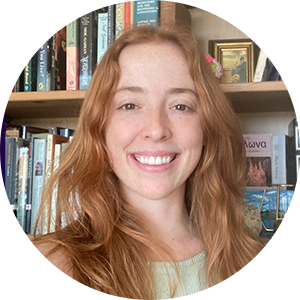

Hannah Stengler, Ancient Mediterranean & Near Eastern Studies and Religious Studies
Hannah has been an executive member of the Ancient Mediterranean and Near Eastern (AMNE) Students’ Association, serving first as the Head of Finance and eventually the President. In her time as a president, AMNE was awarded the AUS Best Club Award for their contributions to the student community.
She has served as an editor for the LOGOS Undergraduate Journal which spotlights undergraduate research within AMNE.
What student leadership opportunity had the most impact on you during your time at UBC?
I think that being President of the AMNE Student Association was a really impactful experience. It was a huge role that pushed me beyond my comfort zone, connecting with a lot of people after the isolation from the pandemic. I found that in being a student leader at UBC, I was enabled to support students around me. I loved building relationships and connecting with others, and my time as President demonstrated how capable I was of making a difference within my community.
What does it mean to be a great Arts student leader?
I think that being able to connect with a great number of people is one of the perks of being an Arts student leader. UBC is a pretty big place and the Arts community has over 16,000 students while UBC itself has over 350 student clubs. In such a large community, being an Arts student leader is about making connections so that you can help build something sustainable and long-lasting for others.
What advice would you give to incoming UBC Arts students?
During my first week at UBC they told us to get out of our comfort zones. Learn something new! That’s what we’re all here for anyway. UBC is a great place to put this into practice and the more you get out there and find something new, the more connections you’ll make. It seems really simple but I know in the rush of deadlines it gets forgotten.
What did you learn about yourself at UBC?
I learned that I am capable of taking initiative and accomplishing great things when I put my heart to it. While working towards my degree, I also participated in other student roles and, at one point, had two jobs while taking a full course load. I am extremely proud of everything I have accomplished at UBC and always astonished that I was able to finish with this kind of achievement to look back on.
What message do you have for your graduating peers?
Get out of your comfort zone! I am so honoured and grateful for all of the support that I have received here at UBC, and this same support is offered to you as well if you are willing to take that step out of your comfort zone.
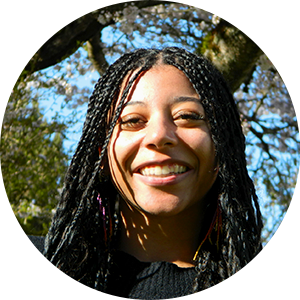

Trinity Stephens, Psychology
Trinity served as an integral member of the Arts Indigenous Student Advisors (AISA), supporting in the successes of new and continuing First Nations, Métis, and Inuit students. There, she offered guidance and tools for degree planning, academic concessions, and connecting students to on-campus communities.
What student leadership opportunity had the most impact on you during your time at UBC?
While working at AISA, I had the privilege of organizing the Indigenous Mentorship Program, following the successful pilot program from the year prior. Meeting and connecting with incoming and upper-year students felt like a full-circle moment. I saw myself in the first year mentees who were both eager and shy. The mentorship program provided the mentees a space to be curious, gain guidance, and have support while transitioning into university. I was able to let my leadership skills shine, while offer valuable tips and advice. At AISA, I was also able to collaborate with GoGlobal, welcoming exchange students from Australia’s Monash University into Vancouver and the UBC campus this past summer.
What does it mean to be a great Arts student leader?
To be acknowledged for this award is an honour, and the connections I have accumulated in my time at UBC have been an extremely heartwarming experience. To me, being a capable leader is demonstrating the ability to have meaningful and admirable relations with a community or group of people. In this way, I believe good leaders are people who have found a level of respect and acceptance within themselves, so they are able to extend this quality of relationships to others.
What advice would you give to incoming UBC Arts students?
There is so much nature and beauty around us on campus. Check out the xʷc̓ic̓əsəm Garden at UBC Farm, and visit UBC’s Botanical Garden. Walk the Greenhart Treewalk and find time to watch a sunset at Wreck beach!
What did you learn about yourself at UBC?
In my early years at university, I would always fear attending events alone, even the ones that interested me personally. Over the years, I exposed myself to situations where I would attend these events by myself without a friend to accompany me. Those are the times where I have had the most meaningful connections and conversations with new people, and I will always appreciate the opportunities I’ve had to step outside my comfort zone and break out of my shell.
